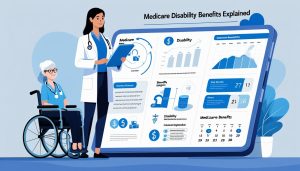Quick Take
Each fall, scammers target millions of seniors with misleading Medicare ads, mailers, and fake “free” benefit offers.
Learn how to recognize the most common scams of 2026 — and how to verify what’s real before sharing any personal information.
In This Guide
- Why Medicare scams are on the rise
- How scammers collect your information
- The 7 biggest Medicare scams of 2026
- How to tell if a call or ad is legitimate
- What to do if you’ve been targeted
Why Medicare Scams Are Rising
Every fall, during Medicare’s Annual Enrollment Period (October 15–December 7), marketing activity explodes. Unfortunately, so do scams.
From “free grocery card” ads to fake government mailers, seniors are being overwhelmed by misleading and often illegal marketing.
Here on Long Island and across the country, many seniors report being called or mailed by people pretending to work “with Medicare.” The truth: Medicare does not make sales calls or send representatives to enroll you in plans.
The Rise of “Too Good to Be True” Medicare Ads
You’ve seen the commercials:
“Get all these benefits — dental, vision, hearing, groceries, and $900 back in your Social Security check!”
“This plan gives you everything for $0!”
“This plan gives you everything for $0!”
Here’s the reality:
Most of these “free” benefits only apply to people who have both Medicare and Medicaid — known as dual-eligible beneficiaries.
If you don’t have Medicaid, those “extras” may not apply to you at all.
Most of these “free” benefits only apply to people who have both Medicare and Medicaid — known as dual-eligible beneficiaries.
If you don’t have Medicaid, those “extras” may not apply to you at all.
And many of these ads aren’t from insurance carriers — they’re from lead-generation companies whose only goal is to collect and sell your information.
How Scammers Collect Your Information
- Spoofed Caller IDs – Calls look like they’re from Medicare, AARP, or your local area code.
- Fake Websites – Pages designed to look like Medicare.gov, asking for your Medicare number.
- Ringless Voicemails & Texts – “Claim your new 2026 benefits now!” or “Confirm your eligibility today.”
- Misleading Direct Mail – Envelopes labeled “Important Medicare Notice” or “Official Government Document” that are really from marketing firms.
- High-Pressure Call Centers – Reps rush you with “you’ll lose coverage if you don’t act now!”
How Big Is the Problem?
According to the U.S. Senate Committee on Aging, Medicare-related scams are among the top five consumer fraud categories every year — costing seniors over $100 million annually.
The danger spikes every October through December, when millions of Americans are comparing plans — and scammers know it.
The 7 Biggest Medicare Scams to Watch for in 2026
- Fake “Free Debit Card” Offers (Medicare Flex Card Scam)
Claims you’ll receive a card for groceries or utilities by switching plans.
→ Reality: Only certain low-income or Medicaid-qualified individuals qualify. - “Zero-Premium” Trap (Hidden Cost Scam)
Promises of $0 premiums — but the plan has higher copays or limited networks. - Spoofed Government Calls (Medicare Phone Scam)
Scammers pretend to be from Medicare or Social Security, asking for your Medicare ID or bank info.
→ Medicare will NEVER call you to sell a plan or collect payment. - Fake Government Mailers (Official-Looking Marketing Scam)
Private marketing firms send mail designed to mimic CMS or Social Security envelopes.
→ Check the return address — real government mail comes from the “Centers for Medicare & Medicaid Services.” - Aggressive Call Center Enrollments (Plan Switching Scam)
Agents enroll you into a plan without checking your doctors or medications — sometimes without your permission. - Ringless Voicemail Campaigns (Urgent “You’re Losing Coverage” Scam)
You receive a prerecorded message telling you to call back immediately to “keep your benefits.” Ignore and delete. - Spam Emails and Text Messages (Phishing Scam)
Messages use fake carrier logos or links promising “new 2026 benefits.” Clicking can install malware or steal your identity.
How Real Licensed Agents (Like Me) Operate
Here’s how to tell the difference between a scam and a real, licensed Medicare agent:
- We don’t cold-call or use robocalls.
- We verify our license and provide full contact info.
- We ask about your doctors, prescriptions, and pharmacy before recommending anything.
- We don’t pressure you — you have until December 7 to make changes.
- We work with all major carriers and act as your advocate, not a sales rep.
If someone claims to be “from Medicare” or pressures you to enroll, hang up and verify through a trusted local source.
Real Examples From Long Island
- A Huntington client received an “Official Medicare Notice” urging her to call a “Benefits Center.” It was a Florida telemarketing firm.
- A Syosset senior clicked on an email offering a “New 2026 Dental Benefit” — it was a phishing scam.
- Several clients received calls claiming to be from UnitedHealthcare, but the numbers traced to offshore call centers.
- One couple was auto-enrolled into a plan after responding to a “Free Flex Card” ad — without ever authorizing it.
What To Do If You Think You’ve Been Targeted
- Never share your Medicare, Social Security, or banking info over the phone.
- Report suspicious calls to 1-800-MEDICARE or reportfraud.ftc.gov.
- Call your local agent if you’re unsure — we can confirm if a call or mailer is legitimate.
- Check your plan at Medicare.gov to confirm your enrollment status.
Understanding the “Free Benefits” Myth
Most TV commercials advertise extras like transportation, dental, vision, hearing, or over-the-counter credits.
The truth:
- Many carrierscut or reduced these benefits for 2026.
- These extras are usually available only to those with Medicaid.
- Even “$0 premium” plans can have high copays and out-of-network costs.
Not Sure What’s Real? Let’s Review It Together.
If you’re unsure about a Medicare call, ad, or mailer, hang up and call me directly. I’ll review it with you — no obligation, no pressure, just honest help.
Paul Barrett | The Modern Medicare Agency Call 631-358-5793 or visit paulbinsurance.com Serving Long Island and Medicare clients nationwide.
Frequently Asked Questions
No. Medicare will never call to sell you a plan or ask for your personal information.
No — but not everyone qualifies. Many plans with $0 premiums have higher copays or smaller provider networks. The quality of these plans will vary by area.
Call 1-800-MEDICARE or file a report with the FTC at reportfraud.ftc.gov.
Ask for their license number, verify it through your state’s Department of Financial Services, and look for a local business address.
Sadly, yes — some call centers have done this. Always verify any plan change through Medicare.gov or with your trusted licensed agent.
Final Thought
Medicare doesn’t have to be confusing — but this time of year, it’s easy to feel overwhelmed. By staying informed, asking questions, and working with a trusted licensed professional, you can protect your coverage, your money, and your peace of mind.






